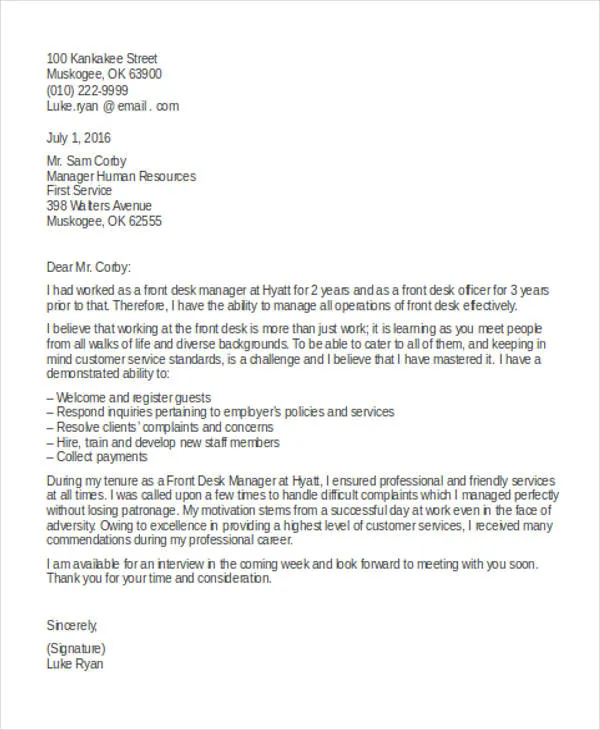Crafting a Compelling Front Desk Cover Letter
A front desk job often serves as the first point of contact for visitors and clients, making a strong cover letter crucial. This document is your initial opportunity to make a positive impression and showcase your suitability for the role. A well-crafted cover letter highlights your relevant skills, experiences, and personality, setting you apart from other applicants. Remember, the front desk position demands a combination of soft and hard skills, and your cover letter should effectively communicate these to a potential employer. Your cover letter should reflect your understanding of the job requirements, your enthusiasm for the opportunity, and your ability to contribute to the organization’s success.
Understanding the Role of a Front Desk Professional
Before drafting your cover letter, grasp the core responsibilities of a front desk professional. This understanding will allow you to tailor your letter, emphasizing the most relevant skills and experiences. Front desk roles vary across industries, from healthcare and hospitality to corporate offices and educational institutions. However, several common tasks and expectations underpin the position, making it vital to highlight these commonalities. Consider the environment and specific requirements of the target role when articulating your skills and achievements.
Key Responsibilities of a Front Desk Staff
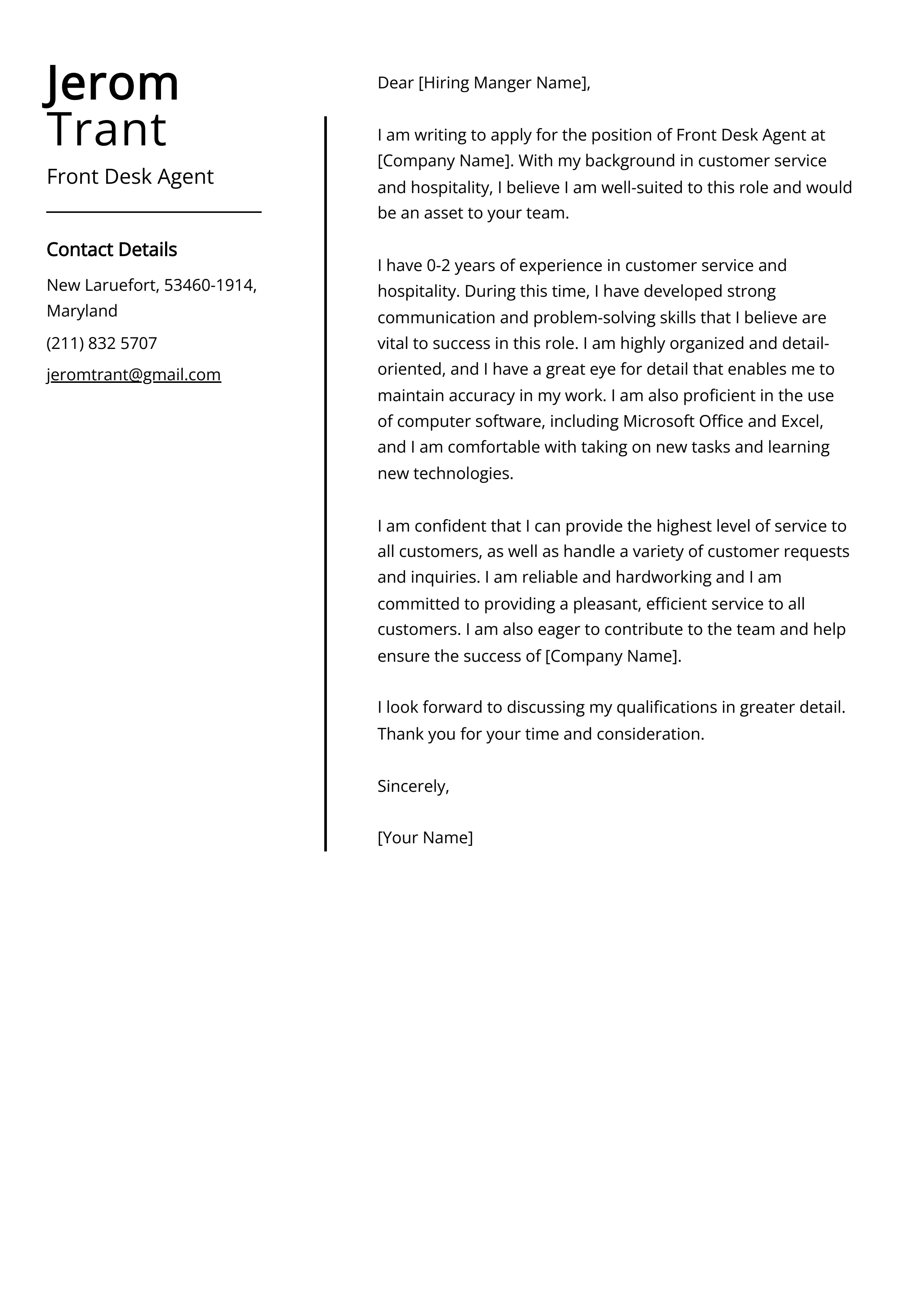
Front desk staff typically manage a variety of tasks. These can include greeting and assisting visitors, answering and directing phone calls, managing mail and deliveries, scheduling appointments, and providing basic administrative support. In some roles, front desk staff may also handle payments, manage inventory, and maintain office supplies. Your cover letter should demonstrate that you comprehend these responsibilities and possess the necessary skills to excel in them. Be sure to customize your cover letter to address the specific job description, showcasing how your skills align with the listed requirements.
Essential Skills to Highlight in Your Cover Letter
A front desk cover letter should showcase your most relevant skills. These include both hard and soft skills. Highlighting the right attributes will significantly improve your chances of getting an interview. Consider the essential qualities employers seek in a front desk professional. These include communication, organizational capabilities, and technical proficiency. Ensure your cover letter vividly demonstrates these skills, providing specific examples of how you have applied them in previous roles or situations.
Communication Skills
Excellent communication skills are paramount for a front desk role. You’ll be the primary point of contact, interacting with visitors, clients, and colleagues daily. Your cover letter should demonstrate your ability to communicate clearly and professionally, both verbally and in writing. Include examples of situations where you effectively conveyed information, resolved conflicts, or provided exceptional customer service. Highlight your ability to listen attentively, respond appropriately, and maintain a positive and welcoming demeanor. These skills are essential for creating a positive first impression and ensuring smooth office operations.
Organizational Skills
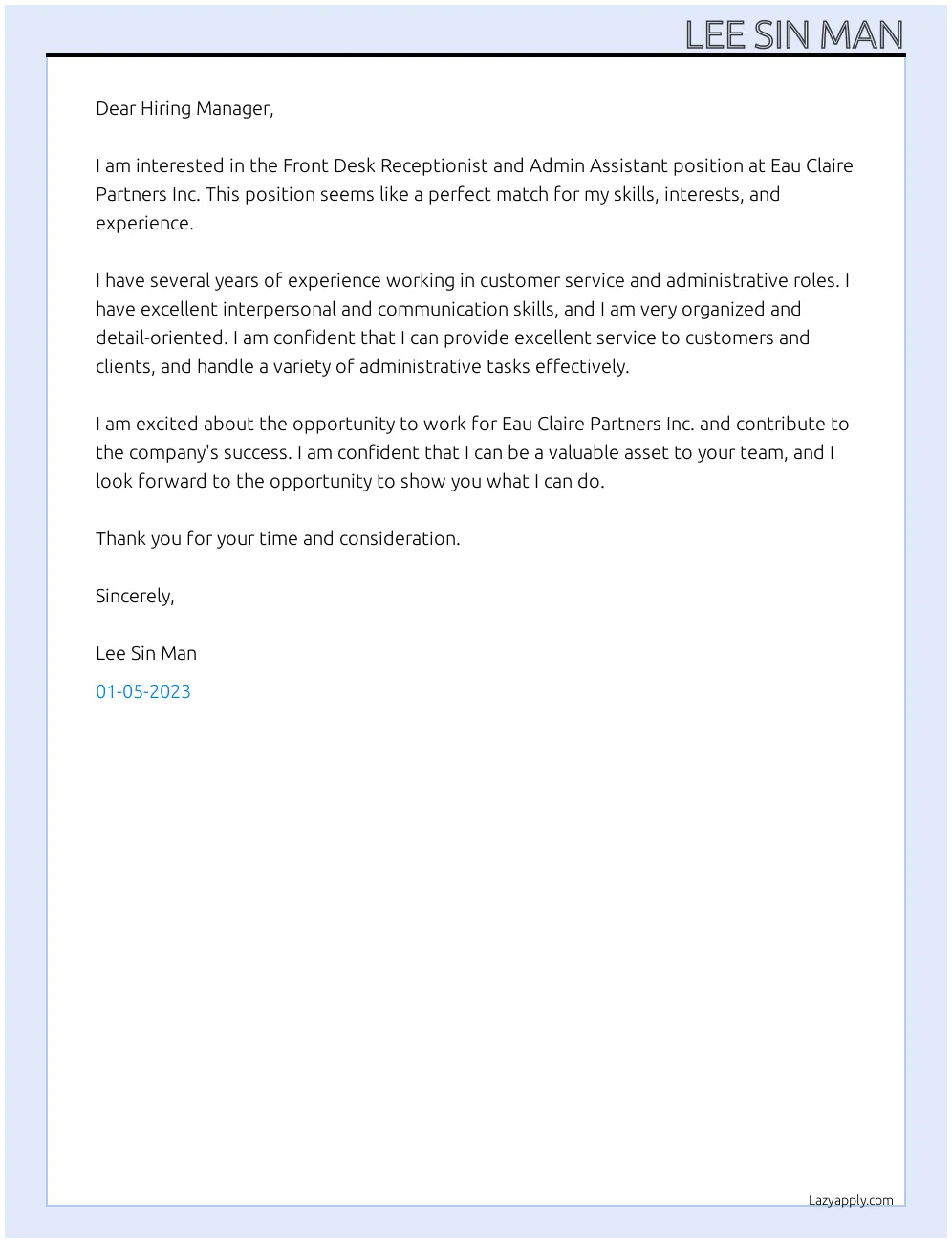
Strong organizational skills are crucial for managing multiple tasks and maintaining an efficient workspace. In your cover letter, illustrate your capacity to manage schedules, prioritize tasks, and maintain accurate records. Provide examples of situations where you successfully organized projects, managed appointments, or streamlined administrative processes. Mention your experience with filing systems, data entry, or other organizational tools. Demonstrating your organizational skills will show potential employers that you can efficiently manage the front desk’s daily operations.
Technical Skills
Proficiency in various software and technologies is a valuable asset for front desk positions. Showcase your experience with email, word processing, and other relevant software applications. Mention any experience with phone systems, appointment scheduling software, or customer relationship management (CRM) systems. If you have experience with specific software, be sure to mention them by name. Your cover letter should reflect your ability to adapt to new technologies and efficiently manage digital tools to support office operations.
Formatting Your Front Desk Cover Letter
The format of your cover letter can significantly impact its effectiveness. A well-formatted cover letter is easy to read, professional, and visually appealing. Adhere to standard business letter formatting guidelines to ensure your letter presents a polished image. Use a clear font, appropriate margins, and concise paragraphs. Your cover letter should be visually balanced and free of clutter, making it easy for a hiring manager to quickly grasp your key qualifications. Proper formatting demonstrates your attention to detail and professionalism, vital traits for a front desk position.
Header and Contact Information
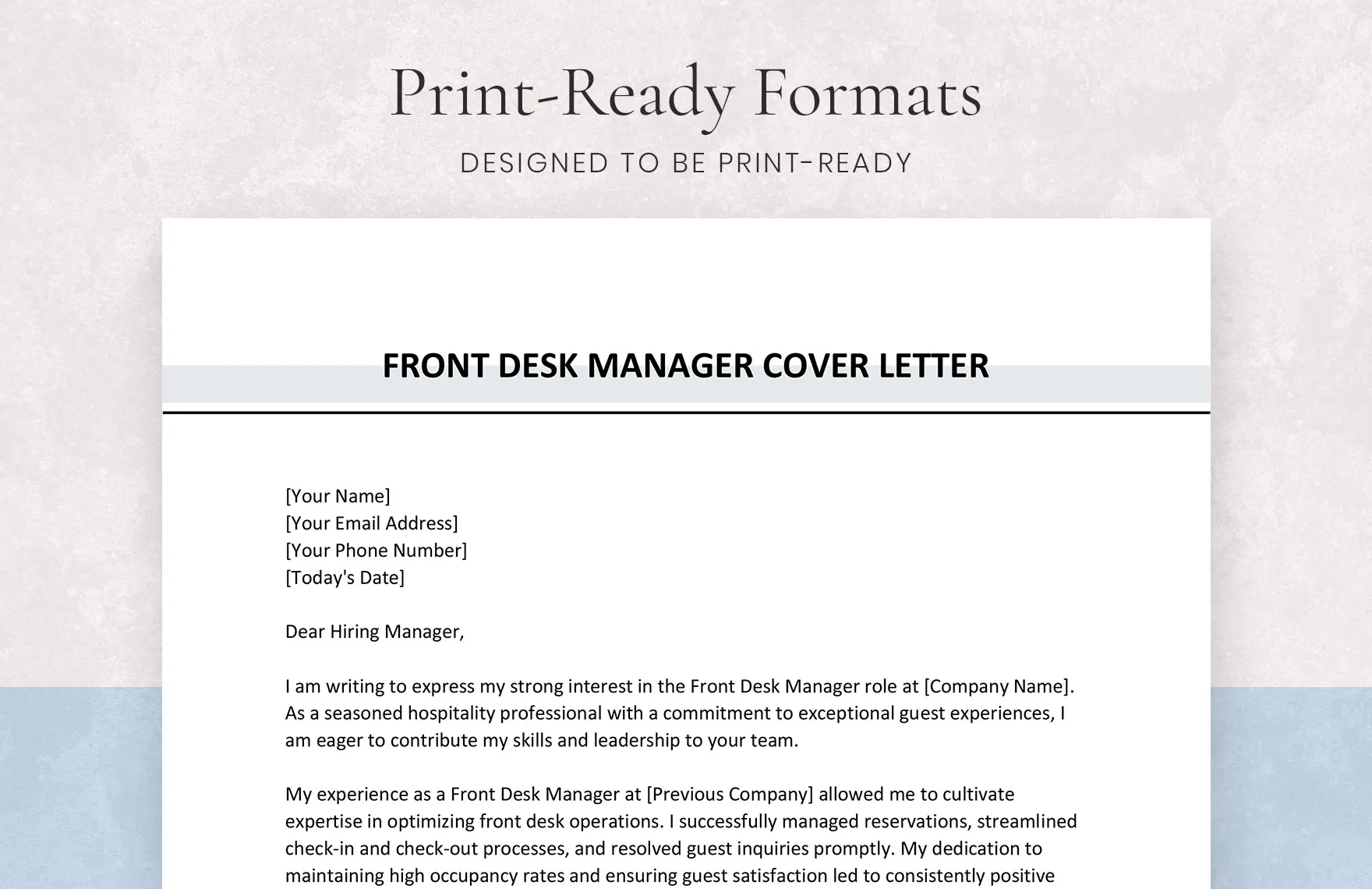
Your cover letter should begin with a professional header. Include your name, address, phone number, and email address. Place this information at the top of the letter, either left-aligned or centered. Following the header, include the date and the recipient’s contact information: their name, title, company, and address. Ensuring the correct recipient information demonstrates your attention to detail and shows that you have taken the time to research the company and personalize your application.
Professional Salutation
Use a professional salutation to address the hiring manager or the specific contact person mentioned in the job posting. If a name is provided, use ‘Dear Mr./Ms./Mx. [Last Name]’. If a name isn’t available, use a general salutation such as ‘Dear Hiring Manager’. Avoid informal greetings or salutations like ‘To Whom It May Concern’ or ‘Hi’. A professional salutation sets a formal and respectful tone from the beginning of your letter.
Opening Paragraph
Your opening paragraph should immediately grab the reader’s attention and state the purpose of your letter. Clearly state the position you’re applying for and where you found the job posting. Briefly mention why you are interested in the role and the company. The opening paragraph should be concise and compelling, encouraging the reader to continue. Create a strong first impression by clearly stating your intention and demonstrating your enthusiasm for the opportunity.
Body Paragraphs Showcasing Your Skills
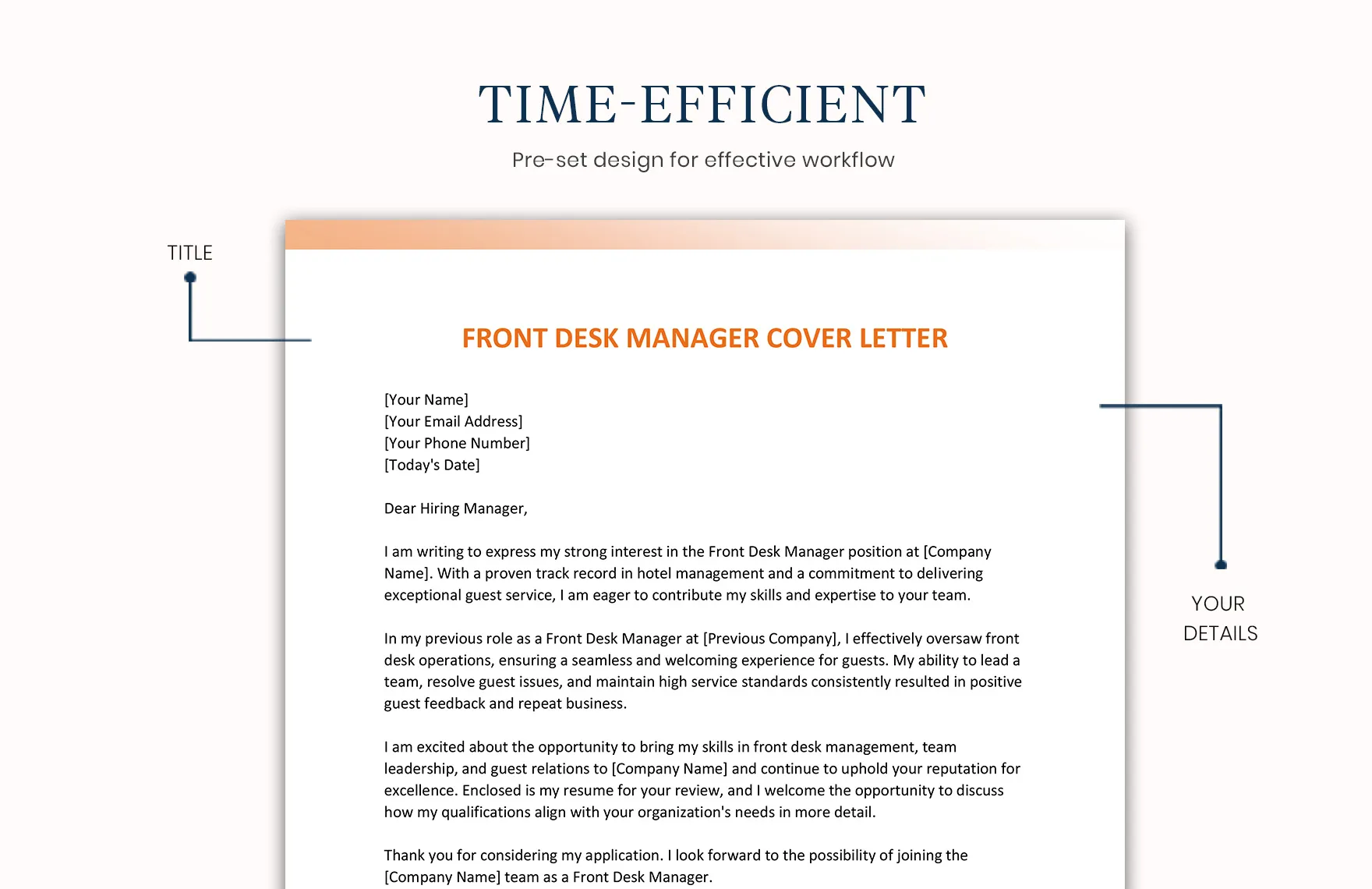
The body paragraphs are the heart of your cover letter. Here, you elaborate on your relevant skills and experiences, providing specific examples to support your claims. Align your skills with the requirements listed in the job description. Quantify your achievements whenever possible. Use action verbs to describe your accomplishments. For instance, instead of saying ‘Managed phone calls,’ say ‘Managed an average of 50 phone calls daily, ensuring prompt and professional responses.’ Be concise and to the point, focusing on the most relevant information.
Tailoring Your Cover Letter to the Job Description
Carefully review the job description and tailor your cover letter to match the specific requirements. Identify the key skills and qualifications the employer seeks and emphasize your relevant experience. Use keywords from the job posting to demonstrate that you understand the role and are a good fit. Customizing your cover letter shows the hiring manager that you are genuinely interested in the position and have taken the time to understand the company’s needs. Addressing the specific needs of the role will significantly increase your chances of securing an interview.
Quantifying Your Achievements
Quantify your achievements by using numbers and data to illustrate your impact in previous roles. For example, if you improved customer satisfaction, mention the percentage increase or the positive feedback you received. If you streamlined a process, mention the time or resource savings achieved. Providing quantifiable results makes your claims more credible and demonstrates your value. This shows potential employers the concrete benefits of hiring you and showcases your contributions.
Closing the Letter Expressing Interest and Availability
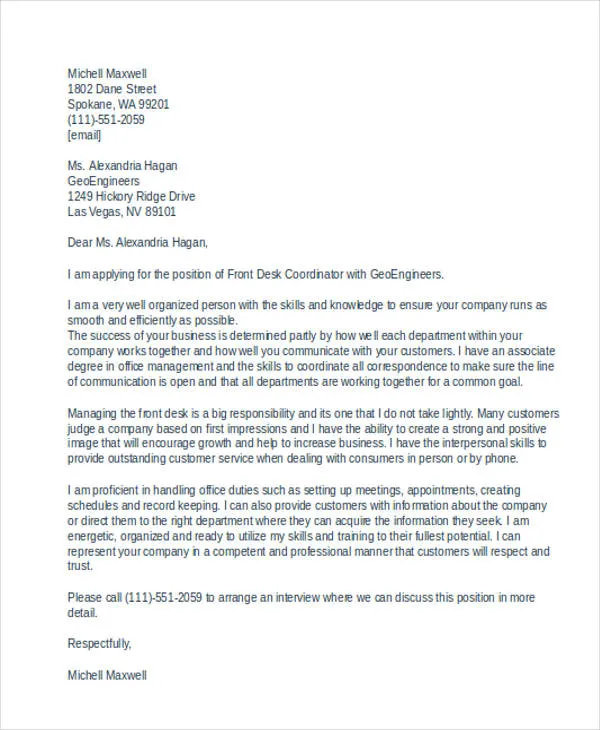
Your closing paragraph should express your interest in the position and your availability for an interview. Reiterate your enthusiasm for the opportunity and thank the hiring manager for their time and consideration. Indicate how you can be reached and state that you look forward to hearing from them soon. A clear and professional closing paragraph reinforces your interest in the role and leaves a positive final impression. Show confidence and eagerness to move forward in the hiring process.
Proofreading and Editing
Proofread and edit your cover letter carefully to ensure it is free of errors. Typos, grammatical mistakes, and formatting inconsistencies can undermine your credibility. Read your letter aloud to catch any awkward phrasing. Consider asking a friend or family member to review your letter as a second pair of eyes often catches errors you may miss. Attention to detail demonstrates your professionalism and shows you value the opportunity.
Common Mistakes to Avoid in Your Cover Letter
Avoiding common mistakes is crucial to make a strong impression. These errors can damage your chances of securing an interview, no matter how qualified you are. The following are some mistakes to avoid. Taking care to avoid these common errors will significantly increase your chances of getting noticed and ultimately landing the front desk job.
Generic Language
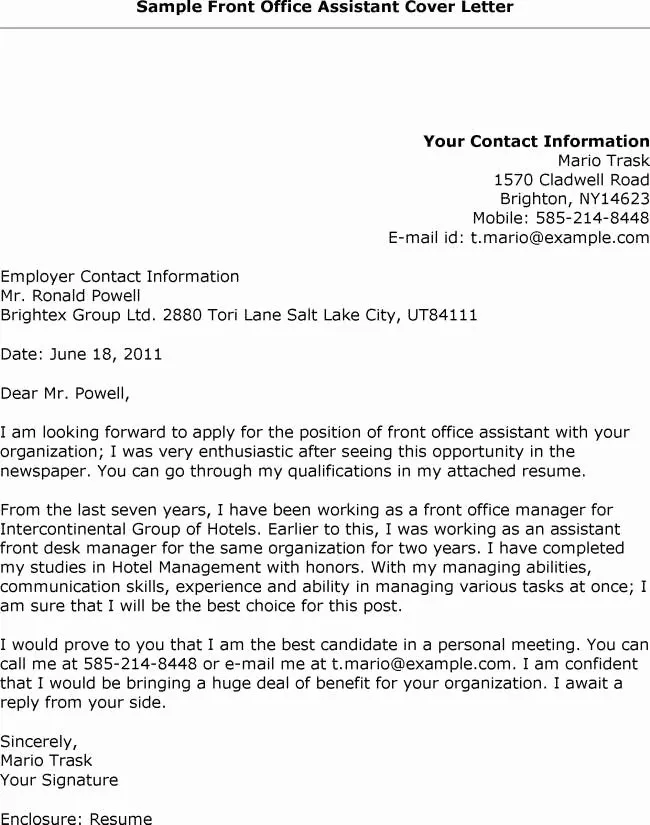
Avoid using generic language or templates. Customize your cover letter to reflect your unique skills and experience and to show that you understand the role and the company. Generic cover letters demonstrate a lack of effort and may be easily overlooked. Tailoring your cover letter to the specific job requirements and company will show that you are genuinely interested in the opportunity. Personalize your cover letter to make it more engaging and memorable.
Typos and Grammatical Errors
Typos and grammatical errors are a major turnoff for hiring managers. These errors indicate a lack of attention to detail and professionalism. Always proofread your cover letter carefully and use a grammar checker to catch any mistakes. Ask someone else to review your letter as a second pair of eyes. A polished and error-free cover letter reflects positively on your abilities and increases your chances of making a good impression.
Not Tailoring the Letter to the Specific Job
Failing to tailor your cover letter to the specific job description is a common mistake. Generic cover letters do not highlight your understanding of the role and the company’s needs. Carefully review the job description and customize your cover letter to match the requirements. Demonstrate that you have taken the time to understand the position and how your skills and experiences align with the employer’s needs. Tailoring your letter will substantially increase your chances of getting noticed.
Additional Tips for a Winning Cover Letter
In addition to the essential elements, several tips can help you create a winning front desk cover letter. Incorporate these strategies to further enhance your application. Consider the company’s values, culture, and goals when crafting your letter. Providing added effort in these details can set you apart from other candidates, and make you look like a perfect fit.
Researching the Company
Researching the company is a crucial step in preparing your cover letter. Demonstrate your interest by learning about the company’s mission, values, and recent activities. Mention something specific about the company that resonates with you. Tailoring your letter based on your company’s background will make you stand out. Showing that you have taken the time to learn about the company demonstrates initiative and genuine interest.
Showcasing Your Personality
While maintaining professionalism, inject some of your personality into your cover letter. Let your enthusiasm for the role and your interest in the company shine through. A little personality can make you more memorable and show you are a good fit for the company culture. Use a tone that reflects your genuine interest and adds a personal touch. Use your cover letter to showcase yourself beyond your qualifications and make a lasting impact.
Following Up After Submission
After submitting your cover letter and resume, follow up with the hiring manager or contact person. If you have not heard back within a week or two, send a brief email to inquire about the status of your application. Express your continued interest in the position and reiterate your qualifications. A well-timed follow-up demonstrates your persistence and commitment to the role. This also lets you reiterate your interest in the role, which can increase your chances of being considered.
